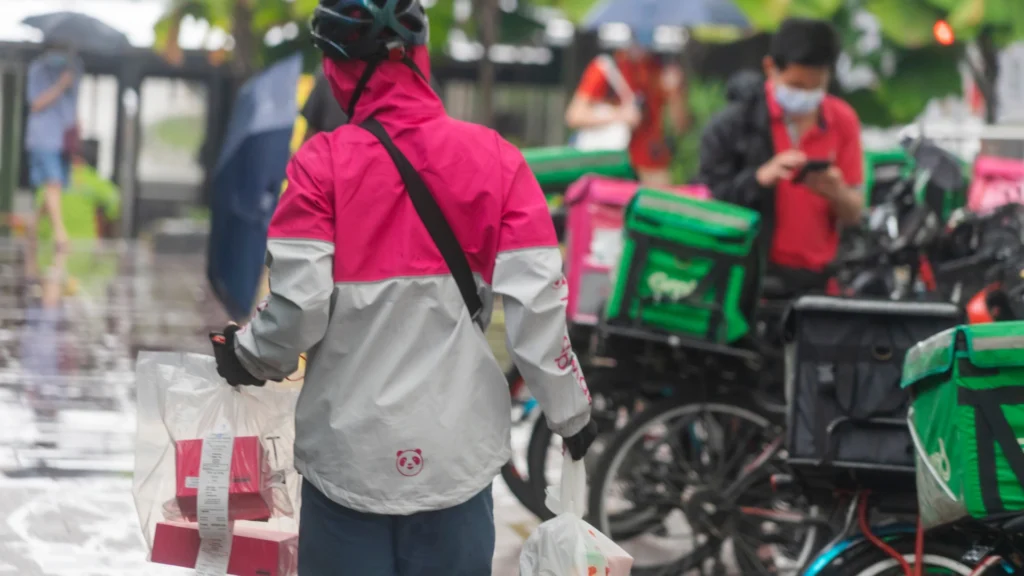-
Malaysia's Gig Economy: The Hidden Healthcare Crisis Revealed
-
The Healthcare Gap in Malaysia's Gig Economy
-
Beyond Delivery Riders: The Broader Freelance Community
-
The EPF Benefits Gap
-
The Hidden Costs of Healthcare Gaps
-
Innovative Solutions: The Rise of Flexible Healthcare Models
-
The Call for Policy Innovation
-
The Role of Digital Platforms
-
The Path Forward: Collaborative Solutions
-
Embracing Collective Responsibility

Malaysia’s bustling streets are increasingly populated by delivery riders zipping between destinations, a visible reminder of our rapidly expanding gig economy. While these workers provide essential services that many Malaysians have come to rely on, they operate in a precarious employment landscape where traditional benefits—including employee healthcare Malaysia provisions—are notably absent.
The Healthcare Gap in Malaysia's Gig Economy
The rise of food delivery platforms, e-hailing services, and freelance marketplaces has created unprecedented flexibility in our workforce. However, this flexibility comes at a significant cost. Unlike traditional employees, gig workers don’t receive the subsidized healthcare benefits that have long been a cornerstone of Malaysian employment.
Traditionally, Malaysian full-time employees benefit from employer EPF contributions, which not only fund retirement but also provide critical healthcare safeguards. Without these EPF benefits, gig workers face a troubling reality: one serious illness or injury could lead to financial ruin.
For many food delivery riders in Kuala Lumpur, the reality is stark: working six days a week, often 12 hours daily, with no income protection during illness and no coverage in case of accidents. This constant uncertainty creates a persistent background anxiety that affects mental and physical well being.
This anxiety is well-founded. Without employer-sponsored protection, gig workers must either purchase private insurance—often prohibitively expensive on their variable incomes—or rely on public healthcare services that may require significant out-of-pocket expenses for non-emergency treatments.
Beyond Delivery Riders: The Broader Freelance Community
While delivery riders might be the most visible face of the gig economy, the healthcare challenge extends to Malaysia’s growing community of digital freelancers, independent consultants, and project-based workers.
These professionals—from graphic designers to content writers, software developers to marketing consultants—have embraced the independence of freelance work but face similar healthcare insecurities. Despite often earning competitive rates, the absence of structured freelancer benefit systems means that illness can quickly deplete savings and disrupt livelihoods.
The problem is particularly acute for those in creative industries, where work may be seasonal or project-based. During busy periods, many freelancers prioritize meeting deadlines over seeking medical care for minor ailments—a choice that can lead to more serious health issues down the line.
The EPF Benefits Gap
Malaysia’s Employees Provident Fund (EPF) has been the backbone of the country’s social security system for decades. Traditional employees benefit from employer contributions that not only build retirement savings but also provide access to healthcare withdrawals in times of need.
For gig workers, this safety net is absent. Without employer contributions, many struggle to make voluntary EPF payments, especially when facing the financial pressures of inconsistent income streams. The result is a workforce that’s not only unprotected in the present but also potentially vulnerable in retirement.
The issue extends beyond just immediate healthcare concerns. Without access to EPF benefits, gig workers miss out on disability insurance, death benefits, and other protections that traditional employees take for granted. This creates a multi-layered vulnerability that affects not just individual workers but potentially their families and dependents as well.
The Hidden Costs of Healthcare Gaps
The lack of employee healthcare Malaysia provisions for gig workers creates ripple effects throughout the economy. When minor health issues go untreated due to cost concerns, they often develop into more serious conditions requiring expensive interventions. This pattern not only harms individual workers but also places additional strain on Malaysia’s public healthcare system.
Moreover, gig workers facing health challenges without adequate support may be forced to continue working while ill—a particular concern for food delivery riders and others in customer-facing roles. This presents potential public health considerations that extend beyond the individual worker.
There’s also a mental health dimension to consider. The stress of working without healthcare protection creates psychological burdens that may further compromise wellbeing. Financial anxiety related to potential medical emergencies has been linked to depression, sleep disorders, and other mental health challenges.

Innovative Solutions: The Rise of Flexible Healthcare Models
As awareness of these challenges grows, innovative solutions are emerging to address the healthcare needs of Malaysia’s gig workforce. These include cooperative insurance models, micro-insurance products, and digital health platforms specifically designed for those with variable incomes.
One such solution making waves in Malaysia is FEV3R, a healthcare subscription app that’s reimagining how freelancers and gig workers access medical care. Unlike traditional insurance models that require large upfront premiums, FEV3R offers flexible subscription-based healthcare access that can be adjusted based on a worker’s fluctuating income.
The platform provides teleconsultations, discounted medication, and subsidized specialist referrals—all without the rigid structures that make traditional healthcare financing inaccessible to many gig workers. For delivery riders working long hours, the ability to consult with a doctor via video call rather than taking time off to visit a clinic represents both a health and financial advantage.
FEV3R was created specifically with Malaysia’s growing independent workforce in mind. The platform recognizes that traditional healthcare models don’t serve gig workers effectively and has built a solution that provides subsidized healthcare access without requiring employer sponsorship or steady monthly income.
The app allows users to pause or adjust their subscriptions during leaner months, ensuring that healthcare protection doesn’t become another financial burden during periods of reduced work. This flexibility directly addresses one of the core challenges facing Malaysia’s gig workers: the unpredictability of income against the constant need for healthcare security.
The Call for Policy Innovation
While private sector solutions like FEV3R are making important contributions, many advocates argue that more comprehensive policy changes are needed to fully address the healthcare challenges faced by gig workers.
Some countries have begun exploring portable benefit systems, where benefits follow workers across multiple gigs rather than being tied to a single employer. Others have modified social security frameworks to accommodate the growing percentage of workers operating outside traditional employment structures.
In Malaysia, discussions around extending EPF benefits to gig workers have gained momentum, with proposals for platforms to contribute to workers’ accounts in proportion to earnings. Such approaches could help bridge the gap between traditional employment benefits and the flexibility demanded by the modern economy.
The Role of Digital Platforms
The companies behind Malaysia’s gig economy platforms have a significant role to play in addressing the healthcare challenges facing their workers. While some have introduced accident insurance and limited healthcare benefits, critics argue these offerings fall short of the comprehensive protection provided in traditional employment relationships.
Progressive platforms are beginning to recognize that worker wellbeing is intrinsically linked to service quality and sustainability. By partnering with healthcare providers and insurers to develop tailored coverage options, these companies can help create more sustainable working conditions while potentially improving worker retention and satisfaction.

The Path Forward: Collaborative Solutions
Addressing Malaysia’s gig economy healthcare challenges will likely require collaboration between multiple stakeholders: government agencies, platform companies, healthcare providers, and workers themselves. The goal should be to develop systems that preserve the flexibility that makes gig work attractive while ensuring that basic healthcare needs don’t become a luxury that workers can’t afford.
Freelancer benefit systems need not mirror traditional employment models exactly, but they must provide comparable levels of protection against healthcare-related financial shocks. This may involve creative approaches to funding, delivery, and accessibility.
The rising popularity of healthcare subscription services like FEV3R points to a potential middle path—combining the flexibility needed by gig workers with the healthcare security traditionally associated with full-time employment. By offering pay-as-you-go access to primary care, preventive services, and discounted specialist treatments, these platforms help bridge the gap between traditional insurance models and the reality of gig work.
For workers like Ahmad and thousands of others navigating Malaysia’s evolving gig economy, such innovations can’t come soon enough. As the sector continues to grow, finding sustainable approaches to healthcare provision will be essential not just for worker wellbeing but for the long-term viability of the gig model itself.
Embracing Collective Responsibility
As Malaysia continues its digital economic transformation, ensuring that all workers—regardless of employment classification—have access to affordable, quality healthcare must remain a priority. The gig economy has delivered convenience to consumers and flexibility to workers, but these benefits shouldn’t come at the cost of basic health security.
By embracing innovative models like FEV3R’s subscription-based approach alongside more comprehensive policy reforms, Malaysia has an opportunity to develop a healthcare ecosystem that works for all participants in the modern economy. The goal should be to ensure that the riders delivering our food, the drivers taking us to work, and the freelancers designing our websites all have access to the care they need to stay healthy and productive.
The silent healthcare crisis facing Malaysia’s gig workers may not make headlines, but addressing it is essential for building a truly inclusive digital economy—one where flexibility and security aren’t competing values but complementary aspects of a sustainable working life.
Contact Us






